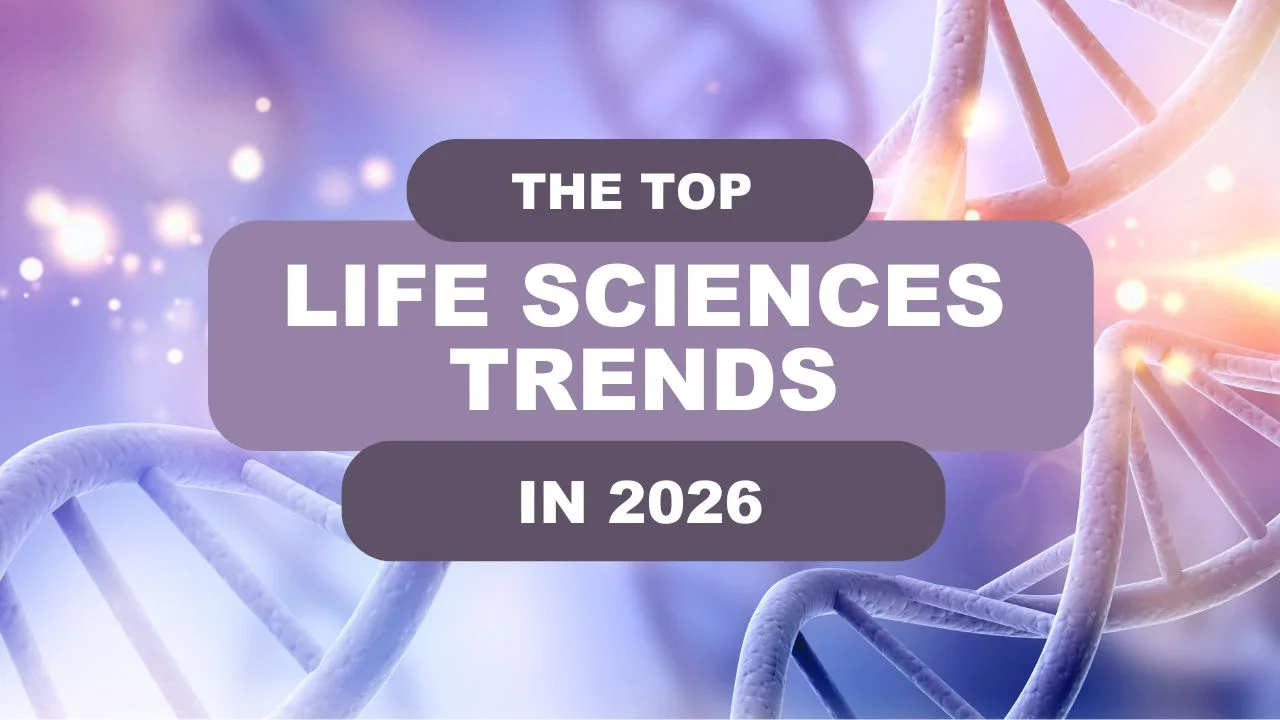
Your Next Career Move in European Biotech: Opportunities in AI, mRNA and Beyond
25 Jul, 20258:02The European biotechnology industry is booming, fuelled by scientific breakthroughs, increas...

The European biotechnology industry is booming, fuelled by scientific breakthroughs, increased investment and a growing demand for innovative healthcare solutions. This means there is a wide range of biotechnology jobs in Europe that are open to skilled professionals, from AI-driven drug discovery to mRNA-based therapies.
So, if you’re considering a career in biotechnology, now is a great time to explore where your expertise could fit within this dynamic field. This blog examines key growth areas, the roles in demand and how you can position yourself for success in biotech roles in Europe.
European Biotech: Innovation and Expansion
The biotech sector in Europe is currently experiencing a period of accelerated and sustained growth. This is being driven by technological developments such as:
- Advances in mRNA technology – mRNA (messenger RNA) technology uses genetic instructions to direct cells to produce specific proteins, enabling tailored medical treatments. Initially proven in vaccines, it is now being used to treat cancers, rare diseases and autoimmune conditions by instructing the body to generate therapeutic proteins or trigger immune responses. Unlike traditional drugs, mRNA therapies can be rapidly redesigned, making them highly adaptable for new applications. This flexibility means that mRNA is a very valuable tool in precision medicine.
- AI and machine learning – Artificial intelligence (AI) and machine learning accelerate drug discovery by analysing vast biological datasets to predict drug interactions, optimise clinical trials and identify disease patterns. These tools reduce the time and cost of research by simulating experiments before lab testing, improving success rates. AI also enhances diagnostics, which enables earlier detection of disease through advanced imaging and genomic analysis. As biotech becomes increasingly data-driven, AI is reshaping how therapies are developed and personalised.
- Synthetic biology and sustainable biomanufacturing – Synthetic biology involves redesigning organisms (such as bacteria or yeast) to produce useful substances, from medicines to biofuels, using engineered DNA. This field merges biology with engineering principles, allowing sustainable alternatives to petrochemical-based manufacturing. By programming cells to perform specific tasks, synthetic biology can create biodegradable materials, lab-grown food and carbon-neutral chemicals, for example.
EU Investment and Regulation
Europe has long been a hub for biotech innovation, with Germany, the UK, France, Spain, and Switzerland leading the way.
The EU also has bold plans for biotechnology and the wider life sciences area. In July 2025, it launched a new strategy with the ambition to “make Europe the most attractive place in the world for life sciences by 2030”. The plan is backed by more than €10 billion annually from the current EU budget, aiming to accelerate innovation, facilitate market access and build public trust in new technologies.
The strategy is linked to the EU’s Horizon Europe research and innovation funding programme, which will provide €100 million in 2026–2027 to develop and deploy microbiome-based solutions.
Meanwhile, venture capital investment in European biotech reached a record high in the first half of 2024, with over €5 billion allocated to innovative start-ups and scale-ups. All of this funding clearly represents a huge opportunity for the biotech sector.
The regulatory landscape is also undergoing changes. The EU Biotech Act will aim to encourage innovation, although it has been delayed until 2026. As yet, it is unclear exactly what shape the Act will take, but in general it will aim to increase public awareness and acceptance of biotech while also streamlining EU legislation.
Key Growth Areas and Leading Companies
1. mRNA and next-generation vaccines
The COVID-19 pandemic demonstrated mRNA’s potential, but its applications now extend far beyond infectious diseases. For example, biotech companies in Europe are exploring how mRNA can be used in vaccines for cancer as well as rare and infectious diseases:
- BioNTech (Germany) – personalised immunotherapies and mRNA vaccines. The company has recently announced investment in the UK worth £1 billion over the next decade, supported by the UK Government.
- Valneva (France) – vaccines for infectious diseases.
- CureVac (Germany) – second-generation mRNA vaccines and cancer immunotherapies.
2. AI and machine learning
AI is revolutionising drug discovery by predicting drug interactions and optimising clinical trials, resulting in the discovery of new products:
- Exscientia (UK) and BenevolentAI (Luxembourg) – AI-designed molecules. AI can be used to optimise the selection of compounds, which reduces costs and increases efficiency.

3. Gene therapy and genome editing
Another key biotech growth area is gene therapy, which involves modifying or introducing genetic material into a patient’s cells to treat or prevent disease:
- CRISPR Therapeutics (Switzerland) – cell therapies to treat sickle cell disease, cancer, heart disease and diabetes among other serious diseases.
- Orchard Therapeutics (UK) – treatment with gene-corrected cells that aims to permanently correct genetic disorders.
4. Synthetic biology
With the EU pushing for a circular bioeconomy, synthetic biology firms are pioneering bio-based alternatives to traditional manufacturing, such as lab-grown materials and carbon-negative chemicals:
- Evologic Technologies (Austria) – use fermentation processes to create living microbes for commercial applications, helping to feed people while using fewer resources.
- Global Bioenergies (France) – convert plant-derived resources into isobutene with applications including energy, materials and cosmetics.
Career Opportunities: Roles in Demand
The expansion of these sub-sectors has led to a surge in demand for biotechnology jobs in Europe, including:
Scientific and technical positions
- Bioinformaticians – experts in genomic data analysis and creating software.
- mRNA researchers – specialists in developing and utilising mRNA for various applications.
- Synthetic biologists – engineers designing microbial strains for sustainable production.
Operational and commercial roles
- Regulatory specialists – ensuring compliance with European Medicines Agency (EMA) and EU regulations.
- Business development managers – driving partnerships between biotech firms and large pharmaceutical providers, such as Roche and AstraZeneca.
- Clinical trial managers – overseeing adaptive trial designs for novel therapies.

What Are Employers Looking For?
In general, digital literacy is essential, with many roles requiring familiarity with laboratory automation, cloud-based data platforms and AI-driven analytics. Additionally, other in-demand skills include:
- Technical skills such as: proficiency in Python/R for bioinformatics or CRISPR for gene editing; experience with AI and machine learning tools (e.g. TensorFlow and PyTorch) in drug discovery; and knowledge of Good Manufacturing Practice (GMP) and Good Laboratory Practice (GLP) standards for regulatory-facing roles.
- Soft skills such as: adaptability given the fast-moving nature of biotech innovation; collaborative working as cross-functional projects require strong teamwork; and problem-solving to navigate uncharted scientific and regulatory challenges.
NES Fircroft Can Support Your Career Move
If you are interested in biotech roles in Europe, consider the following steps:
- Upskill strategically: pursue certifications in bioinformatics, AI in biotech or regulatory compliance. Platforms like Coursera and EMBO list specialised courses.
- Network with industry professionals: attend events such as BIO-Europe and BioTechX, or smaller local biotech meetups. Engage with thought leaders on LinkedIn and ResearchGate.
- Gain hands-on experience: seek internships or collaborations with start-ups and university spin-offs. Contribute to open-source bioinformatics projects (e.g. Bioconductor).
At NES Fircroft, we specialise in connecting candidates with leading biotech firms across Europe. Whether you’re a scientist or business professional, our expertise in biotechnology recruitment in Europe will help you to find roles aligned with your skills and ambitions.
To discover biotechnology jobs in Europe within AI, mRNA and beyond, take the next steps:
- Explore our life sciences and biotech recruitment expertise, as well as the latest vacancies.
- Register via our candidate portal.









